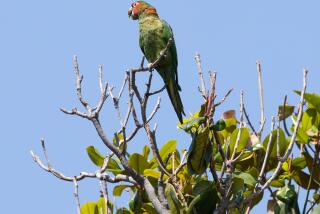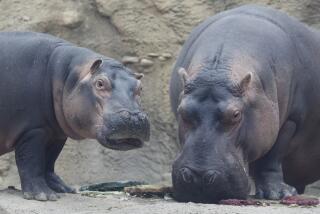London Mayor Finds That Ban on Pigeons May Not Fly
- Share via
LONDON — Sir Henry Havelock stands tall in Trafalgar Square, looking resolute despite the pigeon nestled in his bronze hair and white droppings streaming past his unblinking eyes.
The British imperial war hero may be unmoved by such indignities, but London Mayor Ken Livingstone isn’t. He wants pigeons and generals alike expelled from London’s central square to make way for cleaner and au courant attractions.
In an effort to reduce the enormous pigeon flock, Livingstone this month revoked the license of the concessionaire whose family has sold birdseed on the plaza since 1946.
The idea was that the urban wildlife would be driven to look elsewhere for food.
The reality, animal rights activists insist, is that the hand-fed birds beloved by tourists have lost the hunting instinct. Rather than move to Oxford Street or points beyond, they began dropping dead of hunger by the dozens, the activists say.
“People have found them collapsed on the ground, bones sticking out. We’ve had harrowing e-mails,” said Guy Merchant of the nonprofit Pigeon Control Advisory Service.
The evidence in Trafalgar Square suggests a fate worse perhaps than death--an overdose of junk food. Tourists have been feeding the pigeons French fries, onion rings and diet cola instead of birdseed.
At war with bird lovers, Livingstone went on to confront traditionalists and military buffs last week by declaring the statue of Havelock and, on a neighboring plinth, Sir Charles James Napier, passe.
“I have not a clue who the two generals there are or what they did. I imagine not one person in 10,000 who go through Trafalgar Square knows any details about the lives of those generals,” Livingstone told a meeting of the Greater London Authority.
Napier was a veteran of the War of 1812 against the United States. Havelock, who gained a knighthood and promotion to major general for his prowess in India, is quoted as having told his troops, “Soldiers--your valor will not be forgotten by a grateful country.”
Not according to Livingstone, who suggested that the statues be moved to the bank of the River Thames and replaced by figures that “ordinary Londoners might know.” He called for a citywide debate on the subject.
Livingstone appears less interested in debating the fate of London’s pigeon population. Last summer, he proclaimed that birdseed sold on Trafalgar Square should be laced with contraceptives or banned altogether. He finally opted for the ban.
Bernard Raynor, whose family began selling seed in the square more than half a century ago, says his license expired Sept. 30 without word from the city on his routine application for renewal. The following day, “Livingstone’s henchmen, all 6-foot-6 and dressed in black,” showed up and tried to shut him down, Raynor said.
He refused to go until a woman several days later slapped a letter into his hand from the mayor telling him to cease trading.
“We aren’t in the plans he’s got for Trafalgar Square, and neither are the pigeons,” Raynor said. “But I’ve had a good living there and I think I owe something to the birds. They’ve been good to me and it’s payback time.”
Raynor hired an attorney, who requested that the city grant Raynor a temporary license while reconsidering its decision. A spokeswoman for the mayor said that the temporary license was denied but that the mayor is reviewing Raynor’s application.
Meanwhile, the city stationed burly enforcers on the square to prevent anyone from hawking birdseed. The yellow-vested guards said they were there to stop people from selling feed, not to stop people from feeding the birds. But as tourists repeatedly shoved cameras into their hands and asked them to snap group photographs with the National Gallery and great lions in the background, it seemed the guards were overextended.
While their backs were turned on a recent afternoon, animal rights activist Gerard O’Sullivan slipped into the square in a black jacket--vinyl, not leather; he’s a vegan--and began distributing seed to children like some unsavory character handing out illicit drugs. Glancing furtively over his shoulder, he accepted “donations” for the feed for several minutes before he was collared and given a stern talking-to. He gave out the rest for free.
Londoner Giselle Cody just brought her own feed for the birds.
“This should never have been stopped overnight. The birds just sat there and waited, and by the time they realized the food was not coming, they were too weak to fly,” Cody said. “The mayor didn’t realize how attached Londoners are to their pigeons. We come on weekends to visit the galleries and feed the birds. We can’t have a sterile city.”
Tourists from Iraq, Jamaica, Australia and the United States all showed up expecting to find birdseed for sale. Instead, they were forced to improvise, giving the birds peanuts out of a bag and fast food from Burger King.
“We came all the way here to feed the birds. Fortunately, we have French fries,” said Hadas Hornblas, 19, of Israel.
“Hmm, high-cholesterol diet, not good,” remarked Dave Hanson of Fargo, N.D.
Hanson and his wife said they had made a special trip to Trafalgar Square to get a picture of their 15-year-old son, Miles, with a pigeon on his head.
“The mayor should be drawn and quartered,” Hanson said with a wry smile. “I would be disappointed if the pigeons weren’t here. The pigeons of Trafalgar Square are world-famous.”
Not everyone agrees. Tourist Jackie Kreider of Waukesha, Wis., said she would just as soon not have to pick her way through pigeon droppings, which dot the square despite cleanings to the tune of $150,000 a year. And Daily Telegraph columnist Alice Thomson applauded the mayor’s “courageous war” on what she termed urban vermin.
“He has recognized the 40,000 flying rats in Trafalgar Square for what they are: carriers of flu, TB and Lyme disease,” Thomson wrote.
Hogwash, responded the Evening Standard tabloid’s Brian Sewell, an art critic with opinions on just about everything.
“If it were so, its truth would long since have been evident in the depopulation of the metropolis, the District Line [subway] would be comfortably empty, parking restrictions would never have been introduced, house prices would be the lowest in the land, and Parliament would now be resident in Glossop,” Sewell wrote.
He accused the mayor, whose election platform earlier this year promised a city free of cruelty to animals, of expecting a level of reasoning from pigeons “that is far beyond most of his electorate--the ‘No food here, let’s go elsewhere’ response.”
Traffic, noise and bus fumes are choking Trafalgar Square, Sewell said. Not pigeons.
“We all know that there are plans afoot to remedy this, but they will be decades in the boiling before it becomes a place of gay umbrella cafes,” he wrote. “Until then, the pigeon, the square’s only entertainment, should be left in peace.”
A High Court judge agreed Friday, granting Raynor a temporary license to sell seeds until this afternoon so the birds could eat and Raynor and the city might reach an agreement. If not, Raynor says, it’s back to court.
More to Read
Sign up for Essential California
The most important California stories and recommendations in your inbox every morning.
You may occasionally receive promotional content from the Los Angeles Times.













